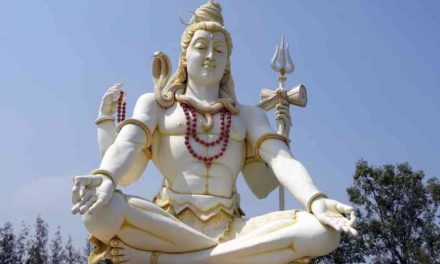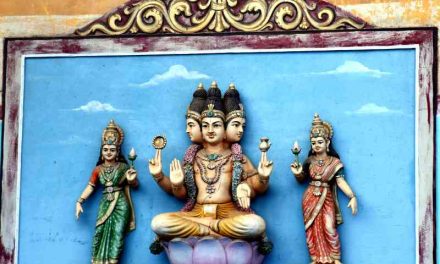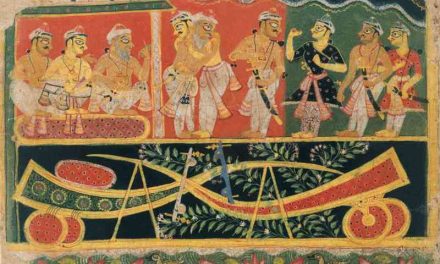The Bhavishya Purana is one of the eighteen major works in the Purana genre of Hinduism, written in Sanskrit. The title Bhavishya means “future” and implies it is a work that contains prophecies regarding the future¹². However, the Bhavishya Purana also contains various stories and legends that have moral and spiritual lessons for the readers. In this blog, we will explore some of these stories and their meanings.
The story of King Pramiti and his son Sumati
One of the stories in the Bhavishya Purana is about King Pramiti, who ruled over a kingdom called Kikata. He had a son named Sumati, who was very intelligent and virtuous. One day, King Pramiti decided to perform a sacrifice to please the gods and invited many sages and Brahmins to his palace. However, he also invited a wicked Brahmin named Keshidhwaja, who was envious of Sumati’s fame and wisdom.
Keshidhwaja plotted to kill Sumati during the sacrifice by poisoning his food. He also bribed some of the other Brahmins to support his plan. However, Sumati was aware of Keshidhwaja’s evil intentions and avoided eating the poisoned food. He also exposed Keshidhwaja’s conspiracy to his father and the other guests. King Pramiti was furious and ordered Keshidhwaja to be executed.
However, Sumati intervened and pleaded with his father to spare Keshidhwaja’s life. He said that killing a Brahmin would bring great sin upon them and that they should forgive him instead. He also said that Keshidhwaja was acting out of ignorance and delusion and that he could be reformed by proper guidance. Sumati’s words impressed everyone present, including Keshidhwaja, who felt ashamed of his actions and begged for forgiveness.
King Pramiti agreed to spare Keshidhwaja’s life on the condition that he would become Sumati’s disciple and learn from him. Keshidhwaja accepted this offer and became a loyal follower of Sumati. He also renounced his evil ways and became a virtuous Brahmin.
The moral of this story is that forgiveness is better than revenge and that even the most wicked person can be transformed by the grace of a noble soul.
The story of King Shashibindu and his wife Madalasa
Another story in the Bhavishya Purana is about King Shashibindu, who ruled over a kingdom called Ujjaini. He had a beautiful wife named Madalasa, who was an incarnation of Goddess Saraswati. She was very learned and wise and taught her husband many spiritual truths.
One day, King Shashibindu went hunting in the forest and came across a deer that was wounded by an arrow. He felt pity for the deer and decided to take it back to his palace and nurse it back to health. However, he did not know that the deer was actually a demon named Dundubhi, who had taken the form of a deer to deceive him.
Dundubhi had a grudge against King Shashibindu because he had killed his brother in a previous battle. He wanted to take revenge by killing himself and his wife. He waited for an opportunity to strike when King Shashibindu was asleep.
However, Madalasa sensed Dundubhi’s evil presence and confronted him. She realized that he was not a deer but a demon and challenged him to a fight. She used her divine powers to defeat Dundubhi and cut off his head. She then woke up her husband and told him what had happened.
King Shashibindu was amazed by his wife’s bravery and intelligence. He praised her for saving his life and thanked her for teaching him the difference between appearance and reality.
The moral of this story is that one should not be deceived by external forms but should look deeper into the essence of things. One should also be grateful for the guidance of a wise partner who can help one overcome ignorance and illusion.
The story of King Satyavrata and Lord Vishnu
A third story in the Bhavishya Purana is about King Satyavrata, who ruled over a kingdom called Dravida. He was a devout worshipper of Lord Vishnu and performed many sacrifices and charities in his name. He also followed the principles of dharma and justice and was loved by his subjects.
One day, King Satyavrata went to the river to perform his daily ablutions. He saw a small fish in the water that was struggling to survive among the bigger fish. He felt compassion for the fish and decided to take it with him and keep it in a jar. However, he was surprised to see that the fish grew bigger and bigger until it filled the jar. He then transferred it to a bigger vessel, but the fish kept growing until it filled that too. He then moved it to a pond, then a lake, then a river, but the fish outgrew them all.
Finally, King Satyavrata realized that the fish was not an ordinary fish but Lord Vishnu himself, who had taken this form to test his devotion. He bowed down to the fish and asked for his forgiveness and blessings.
Lord Vishnu was pleased with King Satyavrata’s kindness and faithfulness. He told him that he had come to warn him of a great flood that would soon destroy the world. He instructed him to build a large boat and take along with him seven sages, one of each species of animal and plant, and the Vedas. He also gave him a rope and told him to tie it to the horn of the fish when the flood came.
King Satyavrata did as he was told and prepared for the flood. When the flood came, he boarded the boat with his companions and tied the rope to the horn of the fish. The fish then dragged the boat across the waters for many days until it reached a safe place on top of a mountain. There, Lord Vishnu appeared again and blessed King Satyavrata and his companions. He also appointed him as the next Manu, or progenitor of mankind, and gave him the name Vaivasvata.
The moral of this story is that one should be compassionate towards all living beings and trust in God’s protection and guidance. One should also be ready to face any calamity with courage and faith.
These are some of the stories and legends of the Bhavishya Purana that have moral and spiritual lessons for us. They teach us how to live a righteous and virtuous life in accordance with dharma and how to attain God’s grace and favor.
Works Cited:
(1) Bhavishya Purana – Wikipedia. https://en.wikipedia.org/wiki/Bhavishya_Purana
(2) Bhavishya Purana – Vyasa Mahabharata. https://www.vyasaonline.com/bhavishya-purana/
(3) Bhavishya Puran: Importance Of Its Predictions – GaneshaSpeaks. https://www.ganeshaspeaks.com/spirituality/hinduism/purana/bhavishya-puran/





